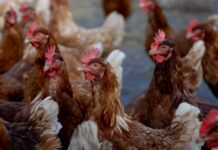COLUMBIA, Mo. – In his 17 years as a University of Missouri animal scientist specializing in turkeys, Jeff Firman has answered a lot of questions about the bird that will grace 45 million Thanksgiving tables this year.
The life of a turkey is not what you’d call ideal. It’s short – 18 to 21 weeks before being processed. They can’t fly. They have no sex life. Commercially produced birds arrive in the world thanks to artificial insemination.
Dumber than a turkey? Turkeys also are not very bright.
“It’s true that turkeys are dumb,” he said. “We’ve never bred them to be smart. A tame turkey in the wild would not have a chance.
“I’ve always said that turkeys eat, drink, sleep and are scared. They’re afraid of everything like birds flying overhead or loud noises.”
On the other hand. Despite all of the above, they can be friendly.
He’s had calls from people who have household pet turkeys that play with cats and dogs.
Not ‘pumped up.’ One question he fields involves the misconception that today’s modern bird is pumped full of hormones to obtain the desired full-breasted plumpness.
The industry is structured so that turkeys are raised in such large numbers it is not practical to inject each bird. The birds take on their physical characteristics through intense genetics, he said.
It takes 75-80 pounds of feed to raise a 30-pound turkey. Basic diet consists of corn and soybean meal combined with meat and grain byproducts, even fats from restaurants like McDonald’s.
“The fat from your French fries is collected, cleaned up and used again to feed birds,” he said.
The largest birds reach weights of more than 80 pounds.
Get 4 Weeks of Farm and Dairy Home Delivered









